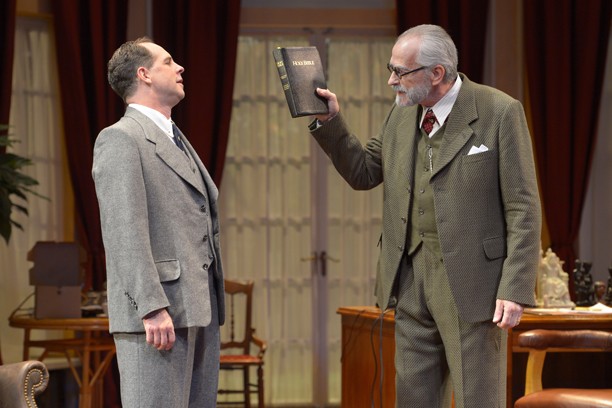War, destruction and political conflict permeate our newspaper headlines. The world seems more and more unstable every day.
“Freud’s Last Session,” put on by Arizona Theatre Company, comes to the stage at a time when many of us are trying to reconcile the conflicts between science and religion.
After ending 2012 with a cheery and romantic musical adaptation of Jane Austen’s “Emma,” ATC now presents audiences with a more thought-provoking production. It’s just what you might expect from a play whose main characters are Freud and C.S. Lewis.
The year is 1939 in London. Freud sits hunched over his desk, listening to the radio. Trains full of fleeing citizens are leaving London for the countryside as Hitler wages war in Europe.
Freud is suffering from oral cancer, which makes it excruciatingly painful for him to talk, but that does not stop him from trying to articulate his point of view to Lewis.. Lewis, a younger, sprightlier gentleman, enters ready to debate with Freud over a book Lewis recently published. He has been invited to Freud’s study and is curious to discuss the famous psychologist’s work as well as his own.
Freud hobbles around with his back hunched while Lewis impassively examines the study, acknowledging the iconic therapist’s couch.
In the beginning, the men are formal and professional, but when the air raid sirens sound, the two adversaries are thrust into a life or death situation; as they scramble for their gas masks, each reacts in his own way. Lewis stands there, hoping for it to pass while calling upon God and his Christian beliefs; Freud thinks realistically about the destruction that might occur any moment.
Freud claims that Lewis is an intellect who has abandoned truth and gone to live with the gods.
With atheism, Freud says, you are left alone. By choosing God and religion, you are in a relationship.
Though they each experience doubt during their debate, and eventually each is caught in a lie that leads him to renounce something he deems important, it is obvious that, in the end, neither will concede defeat.
The theme of reason versus faith is mirrored in the faith and resilience of England aginist Hitler’s Germany as they launch into World War II.
When they begin discussing their fathers and their childhoods, Freud and Lewis finally let down their guards.
They joke as if friends, though each is still analyzing the other and taking stock of their responses.
“There’s no avoiding this, is there?” Lewis says as he points to Freud’s iconic couch.
As they speak to each other, they call the audience to recognize its own doubts.
“Freud’s Last Session” raises questions of propaganda, politics, religion, health and sexuality.
It makes us ask, in such a chaotic world, should we choose to be blissfully ignorant or take on our troubles and try to solve them?
Finally, when the fighter jets of England fly overhead, Freud and Lewis humbly stand together at the front of the stage. At that point they realize no matter what, they will not be able to solve the world’s problems.
A beautifully thought-provoking production with two seemingly opposed intellectuals, “Freud’s Last Session” will stay with you for the rest of the year.









